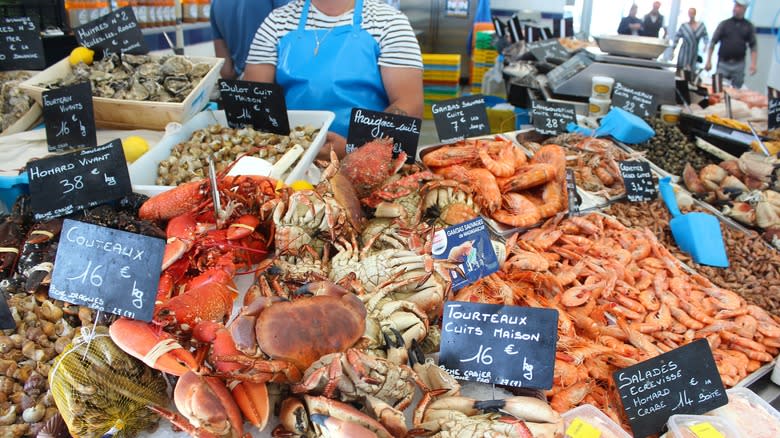What To Look For When Seeking Out A Reliable Fishmonger

For ingredients with the best taste, texture, and flavor, the grocery store seafood section just can't deliver like a trip to your local fishmonger. Uncompromising quality, preparation, and presentation are always good things, but they can be especially crucial when you're preparing sushi or any other kind of raw seafood. In these instances, their presence or absence can make or break your dish, and also potentially save you a trip to the hospital. So, how does an intrepid seafood-loving home cook find their go-to fishmonger in the first place?
A solid foodie tip is to shop like a local. Look for small-scale fishmongers in your area that always seem to pull heavy traffic. That joint down the street that always has a line out the door first thing in the morning should be top of your list. If it advertises a weekly promotion "on Fridays" or any other repeating day, then there's a pretty good chance that it's a business that sees regular customers.
This can be an especially helpful tip if you happen to live in a coastal area or near a Great Lake. Otherwise, customer guidance platforms like Yelp and Google Review can also be useful tools for beginning your scout. Look for fishmongers that have been in business for the longest. A little research can go a long way. Ultimately, the best tool is an in-person visit, and once you're there, there will be visible signs that show if the place is the cream of the crop.
Read more: 15 Different Ways To Cook Fish
Speak Up, Step Out, And Keep Your Eyes Open

Skilled fishmongers can handle mass volume in a choreographed dance of different fish with unique needs, temperature control, and fileting. They tend to be busiest on Thursday through Sunday, which means a crowd to fight but also the greatest variety of selection. Braving the masses can be worth it to find your fishmonger and see what business is like on a high-traffic day. Once you're there, look for a clean, well-organized store. The dish display should be tidy and equipped with a cooling element like ice or a refrigerator.
If a fishmonger seems to be selling through its fish quickly, (i.e., a handwritten "Sold Out" sign posted in the plate glass window hours before closing) and receives regular shipments, that's a good sign. Another way to gauge reliability is to ask your fishmonger questions. If they're well-versed in their craft and can tell you about the catch (and are likely eager for a chance to discuss it, in detail), then you can be sure that your fish is in knowledgeable hands. A good fishmonger can custom cut and debone your fish, tell you where it came from, how it was caught, and the best way to cook it.
Also, to ensure top quality, look for businesses with transparency surrounding sustainability and sourcing. New York-based fishmongers Citarella and Fulton Fish Market, for example, both provide thorough information on their websites regarding vetting and selection processes, harvesting practices, shipping regulations, and quality standards.
Read the original article on Tasting Table.

